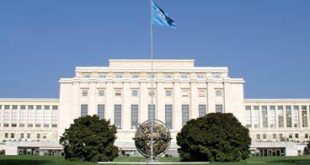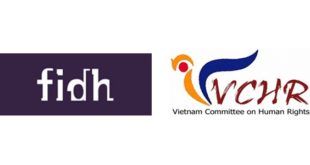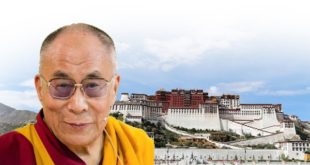 ubcv.ibib@buddhist.com
ubcv.ibib@buddhist.com
 Thich Thien Minh, secular name Huynh Van Ba, was released in a government amnesty on 2 February 2005. A member of the banned Unified Buddhist Church of Vietnam (UBCV), formerly Superior monk at Vinh Binh Pagoda in Bac Lieu, southern Vietnam, Thich Thien Minh has spent over 26 years in re-education camp for his peaceful advocacy of human rights and religious freedom. In 1976, the Communist authorities confiscated his Pagoda for use as a warehouse for the local militia, and later razed it to the ground to build a market and a public park. Thich Thien Minh sent several letters of protest to the Hanoi leadership. Because of this, he was arrested in 1979 and sentenced to life imprisonment. He was detained in Z30A re-education camp, Xuan Loc in Dong Nai province. In 1986, he tried to escape from the camp, and was condemned to a second life sentence by an ad hoc prison tribunal.
Thich Thien Minh, secular name Huynh Van Ba, was released in a government amnesty on 2 February 2005. A member of the banned Unified Buddhist Church of Vietnam (UBCV), formerly Superior monk at Vinh Binh Pagoda in Bac Lieu, southern Vietnam, Thich Thien Minh has spent over 26 years in re-education camp for his peaceful advocacy of human rights and religious freedom. In 1976, the Communist authorities confiscated his Pagoda for use as a warehouse for the local militia, and later razed it to the ground to build a market and a public park. Thich Thien Minh sent several letters of protest to the Hanoi leadership. Because of this, he was arrested in 1979 and sentenced to life imprisonment. He was detained in Z30A re-education camp, Xuan Loc in Dong Nai province. In 1986, he tried to escape from the camp, and was condemned to a second life sentence by an ad hoc prison tribunal.
In 1995, along with 200 other political prisoners in Xuan Loc camp, he launched an appeal for democracy, human rights and the abolition of Article 4 of the Vietnamese Constitution (on the monopoly of the Communist Party). In 1996, he signed a Petition along with 200 other political prisoners calling for improved detention conditions. As a result of these and other protests on behalf of his fellow inmates, Thich Thien Minh was routinely punished with solitary confinement. He once spent a period of three years in a solitary confinement cell, chained by his feet and hands.
On 2 December 1997, the United Nations Working Group on Arbitrary Detention recognized Thich Thien Minh as a victim of arbitrary detention. In October 1998, the U.N. Special Rapporteur on Religious Intolerance, Prof. Abdelfattah Amor, came to visit Thich Thich Minh at Z30A re-education camp during an in situ visit to Vietnam.
Thanks to international pressure, in 2004 Vietnam commuted Thich Thien Minh’s sentence to 20 years. He was thus due for release in 2006. Arrested at the age of 25, Thich Thien Minh is now 51. This interview, which he gave to the International Buddhist Information Bureau was made only hours after his release from re-education camp. It is the first time he has spoken publicly, breaking a silence of 26 years.
IBIB : Venerable Thich Thien Minh, it is a privilege to speak to you on your first day of freedom. First of all, what is your state of health, and when exactly were you released ?
Thich Thien Minh : I was released yesterday, on 2nd February. I have a few health problems that need treatment as soon as possible. Before I was released, officials from the Ministry of Public Security came for a “working session” with me. They said they were considering releasing me in the amnesty on 3rd February, the anniversary of the Vietnamese Communist Party’s foundation. In fact, I was released on 2nd February. I travelled with a group of Security Police who were going to the western port of Ho Chi Minh. But I asked them to drop me off on the way there, so I could go and see my sister and then pay a visit to the Very Venerable Thich Quang Do, Head of the Unified Buddhist Church’s Executive Institute (Vien Hoa Dao). They agreed, and dropped me off near the city centre.
IBIB : What are your feelings on your first day of freedom after 26 years in detention ?
Thich Thien Minh : That’s right, I have been in re-education camp for about 26 years. More than a quarter of a century in detention, simply for supporting the banned Unified Buddhist Church of Vietnam (UBCV). A quarter of a century is nothing compared with the course of history of the Vietnamese people and humankind. But a quarter of a century in the life of a human being is a terribly long time. Especially for a monk, who has a mission to devote his life to helping others…
I was told that I owe my release to the government’s “so-called” policy of clemency. But for me, their “clemency” has come too late. I have suffered too much harsh treatment for too long. In my opinion, their amnesty of political prisoners is a reaction to the pressures and insistence of the international community. Releasing political prisoners, prisoners of conscience and religious prisoners is a sensible and necessary act. But they are doing it as a defensive reaction, something they are forced to do, not something they genuinely want to do.
If they have set me free with the intention of placing me under house arrest, administrative detention or subjecting me to further unfair treatment or discrimination on my release, then it won’t be true freedom. It will be just like transferring me from one prison to another, to a different kind of prison, that’s all.
I believe that, as long as there is no true freedom, democracy or human rights in Vietnam, the whole 80-million Vietnamese people, including myself, will be condemned to live like shadows, crushed by fear, doubt, disillusion and beset by a thousand hardships and cares. These are my thoughts on my first day of freedom.
IBIB : Who else was released in the amnesty from Z30A re-education camp in Xuan Loc ?
Thich Thien Minh : There was Professor Nguyen Dinh Huy and one other prisoner. He was a common criminal, but they classified him as “political” and detained him with us so that he could spy on us, report to the wardens and denounce us, thus enabling the prison authorities to inflict punishment continuously on political prisoners. He was released in the amnesty too. Professor Nguyen Dinh Huy and I both left the camp at the same time, but we travelled in separate cars and went to different places.
IBIB : How many political prisoners are there in Z30A reeducation camp today ?
Thich Thien Minh : There are still a number of political prisoners, and some religious prisoners too. For example, there is Father Pham Minh Tri – he has suffered from dementia for the past 10 years, but they still keep him in the camp – and Father Nguyen Duc Vinh of the Congregation of the Mother Co-redemptrix. Both these men have been detained for the past 18 years, yet they have still not been released. There is also an old man belonging to a branch of the Hoa Hao Sect (Buu son Ky huong). His name is Ngo Quang Vinh. He is 87 years old, and walks with a stick. He is terribly weak and in very poor health, yet they keep him locked in the camp. There are so many elderly political prisoners in Z30A camp, 70-80 year-old men who came into the camp as strong, healthy youths with heads of shining black hair. Now their hair has turned white, their bodies are bent, yet they are still detained. Even if they are released one day, they will be just like walking skeletons, good for nothing, just an extra burden for their families.
IBIB : Was there any difference between detention conditions over the past years and in the period just before your release ?
Thich Thien Minh : Yes. Over the past years, conditions were very harsh. Recently, they were relaxed somewhat. But even so, they remain extremely draconian. For example, prisoners’ families are forbidden to bring more than 5 kilos of food parcels when they visit the camp, anything in excess is confiscated. This was the new quota fixed by the Chief Warden of Z30A re-education camp, Mr. Nguyen Trung Binh. Each prisoner may receive 5 kilos per visit, no more, and their families must not give them more than 300,000 dongs per month (approx. US$20). Considering the high food prices in the canteen, the camp’s exclusive monopoly on all purchases and the exorbitant interests rates they charge, prison life is excruciatingly harsh, especially for poor prisoners whose families cannot afford to visit them often.
In brief, conditions have always been bad, with slight improvements in recent times. But overall, they continue to implement their policy of “controlling people by the stomach”.
IBIB : In 1998, the U.N. Special Rapporteur on Religious Intolerance, Mr. Abdetfallah Amor visited Vietnam. I understand he visited you in Z30A camp, is this correct ?
Thich Thien Minh : In 1998, Mr. Amor came to the camp and met with me and another UBCV monk, Venerable Thich Khong Tanh. We spoke together from 11.00 am until almost 4.00 pm. I told Mr. Amor all about our situation and conditions, and our hopes that the international community would intervene. The prison authorities kept interrupting our meeting in order to prevent us from speaking freely to the U.N. delegation.
IBIB : Did you have to accept any conditions in order to benefit from this amnesty ?
Thich Thien Minh : During the working session with the officials from the Ministry of Public Security, I insisted that they give me back the pagoda they confiscated [in 1976]. They told me to calm down, not to make demands too hastily, to let the Vietnamese government address my problems step by step. These sounded like empty promises to me, they smacked of insincerity, and I think they were only saying them to keep me quiet. Some of the Public Security officials told me I must confine myself to practising Buddhism after my release and not criticize or oppose the government as I did before.
I gave them my honest opinion, plain and clear. I said: “Uncle Ho once declared, wherever there is oppression and injustice, struggle will inevitably follow. Surely, then, the real question that the Vietnamese government should be asking themselves is not why the people are opposing or criticizing them, but whether they themselves have provoked opposition by being oppressive and unjust ?” That is my point of view.
IBIB : What are your projects for the future. Are you going back to your old pagoda ?
Thich Thien Minh : My immediate project is to pay a visit to the Head of the UBCV’s Executive Institute, Very Venerable Thich Quang Do. I am a member of the banned UBCV, and throughout my whole life as a Buddhist monk, the two people I admire and revere most are the UBCV Patriarch, the Most Venerable Thich Huyen Quang and the Very Venerable Thich Quang Do. Then I shall go back to Bac Lieu. This is the address on the release papers I was given in the amnesty, and I must present myself to the local authorities there. But it is not the address of my former pagoda, it is the home of one of my relatives. I am a Buddhist monk, I cannot share the life of lay-people. But the authorities are trying to force me to live as a lay-man and give up my vocation. It is unfitting for monks to live in a secular atmosphere, for we need to live in a secluded and tranquil place where we can meditate. So I shall go to Bac Lieu as instructed, but I shall ask the local authorities either to let me return to my old pagoda, build a new one, or let me reside temporarily in some other monastery so that I can practice Buddhism in peace. When I have got all this sorted out, I will ask the authorities for permission to travel to Ho Chi Minh City, former Saigon, where I will seek help from the UBCV leaders to have an operation on a tumour on my throat, which is really quite painful. Those are my immediate plans.
IBIB : Is there anything else you would like to add ?
Thich Thien Minh : Whilst I was in the camp, I heard from some of my prison colleagues who were arrested after me that the international community had launched appeals for the release of all political prisoners, prisoners of conscience and religious prisoners in Vietnam. Amongst them is Mr. Vo Van Ai, I would like to thank him and ask him to convey my warmest thanks to the U.S Commission on International Religious Freedom, the U.S. government and Congress, the European Union and Parliament, the United Nations, especially Mr. Amor, all international human rights organisations such as Human Rights Watch, Amnesty International (their headquarters in London and their section in Spain), as well as the radio stations and media, and caring people all over the world. I thank all those who have worked selflessly and without rest to obtain the release of prisoners of conscience in Vietnam, prisoners who are detained simply because they have struggled non-violently, day and night, to realize their ideals of freedom, democracy and human rights. Thank you for supporting us and raising your voices on our behalf. Thank you, from the bottom of my heart.
IBIB : Thank you Venerable Thich Thien Minh.
N.B. On 6 February 2005, I.B.I.B. again spoke with Venerable Thich Thien Minh. He had arrived in Bac Lieu and just paid a visit to his brother. Since his arrest, the prison authorities had never informed Thich Thien Minh’s family about his situation. His brother thought that he had died in the camp, and set up an altar in his home, where he prayed for Thich Thien Minh every day. Thich Thien Minh said his brother had suffered continuous harassments and pressures from the Police and authorities for many years simply because of his links with the dissident monk.
 Quê Me Quê Me: Action for democracy in Vietnam & Vietnam Committee on Human Rights
Quê Me Quê Me: Action for democracy in Vietnam & Vietnam Committee on Human Rights




